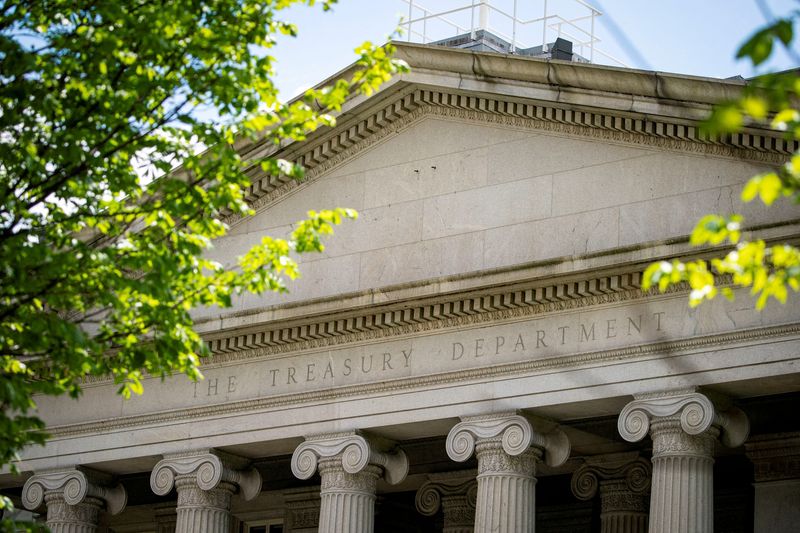Select Language

(Corrects confidence milestone in paragraph 1 to four-year (not four-month))
BEIJING (Reuters) -China's services activity expanded at the slowest pace in eight months and confidence hit a four-year low in June, dragged by slower growth in new orders, a private-sector survey showed on Wednesday, suggesting more economic stimulus is needed.
The Caixin/S&P Global services purchasing managers' index (PMI) eased to 51.2 from 54.0 in May, marking the lowest reading since October 2023 but remaining in expansionary territory for the 18th straight month. The 50-mark separates expansion from contraction.
The survey, which covers mostly private and export-oriented companies, aligned with a broader official PMI released on Sunday that showed activity in the services sector plumbed a five-month low.
The world's second-largest economy has reported patchy growth in recent months, reinforcing calls for more policy support to achieve an ambitious growth target of around 5%.
The new orders subindex fell to 52.1 in June from 55.4 the previous month. Overseas demand also eased slightly even on top of strong exports in May.
Business confidence levels eased to the lowest level since March 2020 with concerns about the global economy and rising competition.
Service providers were scaling back hiring again last month after adding employment in May.
But slower rates of inflation for both input and output prices offered a respite to business owners who were grappling with higher input material, labour and transport costs.
The Caixin/S&P's composite PMI, which tracks both the services and manufacturing sectors, fell to 52.8 from 54.1.
Markets are now focused on a leadership gathering in the middle of July, known as the third plenum, which may announce some reforms.
Measures that redistribute income from central authorities to local governments, thus reducing their reliance on land sales, will top the agenda of the gathering, according to policy advisers.
"Fiscal and tax reforms should focus on creating more optimistic expectations among market participants," said Wang Zhe, senior economist at Caixin Insight Group.

By Davide Barbuscia
NEW YORK (Reuters) - A measure of the borrowing costs on loans between banks and other participants in the U.S. repurchase agreement (repo) market hit its highest level since January on Monday, New York Federal Reserve data released on Tuesday showed.
The Secured Overnight Financing Rate (SOFR), a measure of the cost of borrowing cash overnight collateralized by Treasury securities, hit 5.4%, the highest since Jan. 2, in a sign of dwindling liquidity.
The jump from 5.33% at the end of last week follows heavy Treasury coupon debt supply, with the settlement of Treasury auctions straining banks' balance sheets, analysts said.
"SOFR should normalize in the coming days, as the supply gets digested," said Teresa Ho, head of U.S. short duration strategy at JPMorgan.
"However, it might take a little bit longer to normalize, not only because primary dealer inventories are already high, but also because it’s a holiday shortened week, providing less liquidity to the markets," she said.
A spike in the price for repurchase agreements, or repos, can be a sign that cash is getting scarce in a key funding market for Wall Street. Short-term funding costs spiked in September 2019, forcing the Federal Reserve to intervene by injecting liquidity into repo markets.
"Everyone's keeping a close eye on it because it is reminiscent of what happened in 2019," said Gennadiy Goldberg, head of U.S. rates strategy at TD Securities USA.
The jump in funding rates roughly coincided with an increase in usage of the Federal Reserve Bank of New York's reverse repo facility, through which money market funds lend to the Fed.
The facility last week saw $664.6 billion in inflows, the highest level since $680 billion on Jan. 10.
Such increases tend to happen around the end of the quarter as dealers offer less intermediation for regulatory reasons, prompting market participants to park their cash at the Fed.
"Around quarter end is when you typically have a pullback in balance sheet availability because a lot of the banks are looking to de-risk heading into quarter end," said Goldberg.
"You're starting to see more of an impact now that liquidity is not as ample as it used to be," he said.

By Balazs Koranyi
SINTRA, Portugal (Reuters) - The European Central Bank's next interest rate cut is still a relatively easy decision, but subsequent moves should only come once inflation is clearly heading towards the 2% target, ECB policymaker Pierre Wunsch said in an interview.
The ECB cut rates in early June but made no commitment about any further moves, arguing inflation was still too high and it lacked the confidence that 2% was within reach.
Wunsch already said at the time that the first two cuts were easy decisions and continues to maintain this view despite more recent figures showing stubborn wages and services price growth.
"If we have no major negative surprises, then based on our forecasts, I would say there is room for a second cut," Wunsch, Belgium's central bank governor told Reuters on Monday. "A small deviation from the projections would not change this view dramatically."
But even this second cut was not urgent, he said, and the ECB could wait until its next projections are due out in September.
"There is probably a premium in waiting for a meeting with new forecasts that confirm the picture but I would not make that a condition," Wunsch said.
Inflation is expected to have slowed to 2.5% last month from 2.6% in May, but the ECB sees a "bumpy" path ahead with figures oscillating around current levels for the rest of the year.
This could make it hard to cut again until figures start showing a more decisive move towards 2%.
"To continue with cuts, I would need to have some more comfort that we really are going down from 2.5% inflation to something which is closer to 2%," Wunsch said. "Do you want to go below 1% real spot rates? That's where it becomes a little bit more difficult for me."
The ECB's deposit rate stands at 3.75% and markets are betting on about 40 basis points of cuts over the rest of the year, or between one and two moves, and also see a total of four cuts in the next 18 months.
While economic growth is rebounding modestly and markets are relatively calm, a first round election victory by the far right in France complicates the picture. Wunsch said more political turbulence is possible given several countries need painful fiscal adjustments after years of excessive spending.
"In Europe as a whole, we now have five countries in excessive deficit procedures," he said. "It's not going to be easy in any of those five countries. I was never expecting that reducing these deficits will be easy."
But he also played down any talk the ECB could activate an emergency bond purchase scheme in case political stress reverberated in financial markets.
ECB officials have said markets moves need to be unwarranted and disorderly for the ECB to step in, and events so far failed to meet those criteria.
"I think it's very important that we don't give any signal to the market that we have some kind of automaticity, limits, or hard constraints in what we do," Wunsch said. "The rule is that it must be unwarranted and disorderly. It will be a judgment call."

By Yoruk Bahceli and Samuel Indyk
(Reuters) -Investors are sceptical that the relief rally after France's first-round parliamentary election can last, wary that the outlook for the country's creaking public finances will remain in focus with several political hurdles ahead.
The closely-watched spread French government bonds pay over Germany's retreated from a 12-year high on Monday and bank shares surged as Marine Le Pen's National Rally (RN) scored a win smaller than some polls had expected on Sunday.
The results lessen the chance of an absolute majority for the RN, or a win for the left-wing alliance that came second, and were a relief for markets rattled since the surprise election was called last month.
But investors remained cautious with uncertainty high ahead of a second-round vote on July 7 and beyond, seeing little scope for improvement in France's weak fiscal position as both the far-right and left have pledged big spending increases.
"It would be too premature to say the battle is over," said Nicolas Forest, CIO at asset manager Candriam.
"We are at the beginning of a new political era in France and the situation will stay very uncertain and very complicated."
Even after Monday's bounce, French assets have barely recovered. France's 10-year yield rose to its highest since November on Monday. The French/German bond spread is still over 25 basis points wider than before President Emmanuel Macron called the election on June 9 and not expected to recover any time soon. Shares in France's three biggest lenders are still down 7-12%%.

LONDON (Reuters) - Prices in British shops rose at the slowest pace in almost three years last month, according to industry figures that underscore how inflation has cooled even if Prime Minister Rishi Sunak is unlikely to see much benefit in this week's national election.
Annual shop price inflation slowed to 0.2% in June from 0.6%in May, the smallest increase since October 2021, the British Retail Consortium said on Tuesday.
Prices for non-food goods fell by 1.0% in annual terms after a 0.8% drop in May - helped by promotions on TV sets timed to coincide with the Euro 2024 soccer tournament - while food inflation slowed for a 14th month in a row to 2.5% from 3.2%%.
"This will be of help to shoppers as they plan their household budgets for essential goods and services," said Mike Watson, head of retailer and business insight at NielsenIQ, which provides data for the BRC.
"With uncertainty around discretionary spending, we expect the intense competition across the marketplace to keep price increases as low as possible this summer."
Sunak has sought to claim credit for the fall in headline inflation which topped 11% in 2022 and returned in May to the Bank of England's 2% target. But opinion polls suggest his Conservative Party will lose heavily to the opposition Labour Party in Thursday's election.
The BoE is assessing whether price pressures have abated sufficiently for it to cut interest rates for the first time since 2020. However, with inflation in the services sector running at nearly 6%, it remains unclear when it might make its move.
Investors are putting a roughly 60% chance on the BoE cutting Bank Rate to 5.0% from 5.25% on Aug. 1.
BRC Chief Executive Helen Dickinson said investment by retailers to improve their operations and supply chains was limiting price rises. She urged the next government to fix cost burdens such as the business rates tax on commercial property and an apprenticeship levy that employers say is inflexible.

By Libby George and Karin Strohecker
LONDON (Reuters) -Ukraine told investors it still expects to succeed in its unprecedented aim of restructuring debt in the middle of a war before payment moratoriums expire by Aug. 1, according to two sources who joined a call with the Finance Ministry on Monday.
The war-torn country also intends to include GDP warrants as part of its effort to restructure some $20 billion of international bonds, said the sources.
Monday's call marks part of Ukraine's fresh push to engage with investors after formal restructuring talks last month ended without an agreement.
Statements released last week showed there was a wide gap between the 20% haircut bondholders are prepared to give and a proposal from Ukraine that would have translated into a haircut of up to 60%.
"They believe that an agreement can be reached soon," one of the sources said, speaking on condition of anonymity. Yuriy Butsa, head of Ukraine's debt management office, who is leading the country's engagement with creditors, spoke on the call and was joined by representatives from the government's advisers and the IMF mission chief to Ukraine, Gavin Gray, the sources said.
On the creditor side, members of the Ad Hoc Creditor Committee joined, along with investors who were not part of the group.
Ukraine has $19.7 billion outstanding on its international bonds and owes $2.6 billion on GDP warrants - a fixed-income instrument with payouts that are linked to the strength of economic output growth. The warrants were created as a sweetener to creditors during Ukraine's 2015 debt restructuring in the wake of Russia's annexation of Crimea.

SEOUL (Reuters) - South Korea's consumer inflation weakened more than expected to an 11-month low in June as supply-side pressures eased, official data showed on Tuesday.
The consumer price index (CPI) rose 2.4% higher in June from a year earlier, slower than the 2.7% rise in May and the weakest since July 2023, according to Statistics Korea.
It was also well below the median 2.7% rise tipped in a Reuters survey of economists.
The index fell 0.2% on a monthly basis, after a 0.1% rise in the previous month, marking the first decline in seven months.
By product, prices of agricultural goods fell 5.3% over the month while petroleum goods lost 2.9%, dragging the index lower.
South Korea's central bank governor said last month the pace of consumer inflation is likely to continue to slow, feeding expectations the Bank of Korea will start cutting interest rates towards the end of this year.
The central bank, which targets medium-term inflation of 2%, extended its interest rate pause for an 11th straight meeting in May. The bank next meets on July 11.
The core CPI, excluding volatile food and energy items, was 2.2% higher in June than a year before, in line with May.

By Tim Hepher, Shivani Tanna and Mike Stone
(Reuters) -Boeing agreed to buy back Spirit AeroSystems (NYSE:SPR) for $4.7 billion in stock and Airbus moved to take on the supplier's loss-making Europe-focused activities in return for hundreds of millions of dollars of compensation in a rare coordinated move.
The near-two-decade independence of the world's largest standalone aerostructures company ended in a carve-up between its largest customers after the Boeing (NYSE:BA) 737 MAX crisis sparked by a mid-air door plug blowout in January brought to a head doubts over the resilience of fuselage manufacturing.
Boeing, which spun off Spirit in 2005, said it would buy its former subsidiary for about $37.25 per share, as reported by Reuters on Sunday, giving it an enterprise value of $8.3 billion including debt.
"Bringing Spirit and Boeing together will enable greater integration of both companies' manufacturing and engineering capabilities, including safety and quality systems," Spirit CEO Pat Shanahan said in a statement.
Spirit's shares closed at $32.87 on Friday. The Wichita, Kansas-based company said the deal value offered a 30% premium since the day before Boeing and Spirit announced merger talks on March 1.
Boeing has long pondered buying back its former subsidiary, which analysts say has struggled to thrive independently despite diversifying into work for Europe's Airbus and others.
But the decision to go ahead comes as Boeing tries to resolve a sprawling corporate and industrial crisis that has engulfed one of the industry's key suppliers.
Boeing is trying to move past months of difficulties sparked by the Jan. 5 blowout of a door plug on a virtually new Alaska Airlines 737 MAX 9 jet that exposed industrial quality problems.
Those issues have led to a substantial slowdown in output at Boeing, rippling across the global commercial aviation industry.
The U.S. planemaker has announced the planned departure of its CEO, Dave Calhoun in the wake of the crisis, with industry executives and analysts pointing to Spirit's Shanahan, a former Boeing executive, as one of the possible replacements.
It was not immediately clear how long he might be tied to Spirit, with the Boeing deal not due to close until mid-2025.
AIRBUS DEAL
Spirit, the manufacturer of the door plug, had been spun off from Boeing in one of a series of moves that critics say were emblematic of a focus on cost-cutting over quality.
Boeing made the decision to buy back Spirit in the aftermath of the door plug blowout, in what it described as an effort to address its safety problems and shore up its production line.
Separately, Airbus, also a Spirit customer, confirmed it would take over core activities at four of the supplier's plants in the United States, Northern Ireland, France and Morocco as reported by Reuters last week.
It will also take over minor work currently carried out in Wichita. The separate Airbus deal was triggered by talks between Boeing and Spirit and was loosely coordinated between the three companies, sources said. It is subject to due diligence.
Airbus shares opened 2.4% higher on Monday.
Because the Airbus-related activities lose money, industry sources had said the European planemaker was pressing for up to $1 billion in compensation in return for taking over the plants, which make strategic parts for the A350 and A220 jets.
Airbus said it would receive $559 million in compensation from Spirit, depending on the final outlines of the deal, while it would pay the supplier a symbolic $1 for the assets.
That echoes its decision to buy the Canadian-designed CSeries small jetliner program for just $1 from Bombardier (OTC:BDRBF) in 2018. It later renamed the jet the A220.
Until the latest shake-up, Airbus had not proposed to take control of the high-tech but loss-making A220 wings manufacturing carried out in a historic plant in Belfast, which Spirit bought from Bombardier in 2019.
Monday's deal lifts doubts over the future of Northern Ireland's top industrial employer for the second time in five years, though sources have said Airbus may need to invest $1 billion to $2 billion in a redesign to make the wings affordable to produce.
Spirit said it also planned to sell businesses and operations in Prestwick, Scotland and in Subang, Malaysia that support Airbus programs and those in Belfast that do not support Airbus programs.

BEIJING (Reuters) - Prices of new homes in China climbed at their slowest pace in five months in June, a private survey showed on Monday, with a recent major government package of support measures for the country's ailing property sector having only a limited impact so far.
The average price for new homes across 100 cities edged up 0.15% month-on-month in June, weaker than a 0.25% gain in May, according to data from property researcher China Index Academy.
The value of new home sales at China's top 100 real estate companies slid 41.6% in January-June from the same period a year ago, it also said.
In May, Chinese authorities unveiled what they called a historic support package for the property sector that has been hit hard by a liquidity crunch since 2021 with many firms defaulting on debt.
The package further cut downpayment requirements and removed the floor for mortgage rates. Local governments can also now instruct state-owned firms (SOEs) to purchase completed unsold apartments from property developers and convert them into social housing.
The China Index Academy data also showed the average price of second-hand homes across 100 cities fell 0.73% in June from a month earlier, the 26th straight month of declines.

By Juliette Jabkhiro and Layli Foroudi
PARIS (Reuters) -Marine Le Pen's far-right National Rally (RN) party scored historic gains to win the first round of France's parliamentary election on Sunday, exit polls showed, but the final result will depend on days of horsetrading before next week's run-off.
The RN was seen winning around 34% of the vote, exit polls from Ipsos, Ifop, OpinionWay and Elabe showed, in a huge setback for President Emmanuel Macron who had called the snap election after his ticket was trounced by the RN in European Parliament elections earlier this month.
The RN's share of the vote was comfortably ahead of leftist and centrist rivals, including Macron's Together alliance, whose bloc was seen winning 20.5%-23%. The New Popular Front (NFP), a hastily assembled left-wing coalition, was projected to win around 29% of the vote, the exit polls showed.
The exit polls were in line with opinion surveys ahead of the election, and were met with jubilation by Le Pen's supporters. However, they provided little clarity on whether the anti-immigrant, eurosceptic RN will be able to form a government to "cohabit" with the pro-EU Macron after next Sunday's run-off.
A longtime pariah for many in France, the RN is now closer to power than it has ever been. Le Pen has sought to clean up the image of a party known for racism and antisemitism, a tactic that has worked amid voter anger at Macron, the high cost of living and growing concerns over immigration.
At Le Pen's Henin-Beaumont constituency in northern France, supporters waved French flags and sung the Marseillaise.
"The French have shown their willingness to turn the page on a contemptuous and corrosive power," Le Pen told the cheering crowd.
The RN's chances of winning power next week will depend on the political dealmaking made by its rivals over the coming days. In the past, centre-right and centre-left parties have teamed up to keep the RN from power, but that dynamic, known as the "republican front," is less certain than ever.
If no candidate reaches 50% in the first round, the top two contenders automatically qualify for the second round, as well as all those with 12.5% of registered voters. In the run-off, whoever wins the most votes take the constituency.
High turnout on Sunday suggests France is heading for a record number of three-way run-offs. These generally benefit the RN much more than two-way contests, experts say.
The horsetrading began almost immediately on Sunday night.
Macron called on voters to rally behind candidates who are "clearly republican and democratic", which, based on his recent declarations, would exclude candidates from the RN and from the hard-left France Unbowed (LFI) party.
Political leaders from the centre-left and far-left all called on their third-placed candidates to drop out.
"Our guideline is simple and clear: not a single more vote for the National Rally," France Unbowed leader Jean-Luc Melenchon said.
However, the centre-right Republicans party, which split ahead of the vote with a small number of its lawmakers joining the RN, gave no guidance.
POSSIBLE PRIME MINISTER
Jordan Bardella, the 28-year-old RN party president, said he was ready to be prime minister - if his party wins an absolute majority. He has ruled out trying to form a minority government and neither Macron nor the NFP leftist group will form an alliance with him.
"I will be a "cohabitation" Prime Minister, respectful of the constitution and of the office of President of the Republic, but uncompromising about the policies we will implement," he said.
The mood was gloomy at the Republique square in Paris, where a few thousand anti-RN protesters gathered at a rally of the leftist alliance on Sunday night.
Najiya Khaldi, a 33-year-old teacher, said she felt "disgust, sadness and fear" at the RN's strong results.
"I am not used to demonstrating," she said. "I think I came to reassure myself, to not feel alone."
Market reaction to Sunday's result was muted, with the euro gaining around 0.23% in early Asia-Pacific trading. Fiona Cincotta, senior markets analyst at London's City Index, described relief that the result yielded "no surprises."
"Le Pen had a slightly smaller margin than some of the polls had pointed to, which may have helped the euro a little bit higher on the open," she said. "Attention now is on July 7 to see whether the second round supports an absolute majority or not. So it does feel like we're a little bit in limbo."
COMPLEX CALCULUS
The RN was seen winning the most seats in the National Assembly, but only one of the pollsters - Elabe - had the party winning an absolute majority of 289 seats in the run-off.
Experts say seat projections after first-round votes can be highly inaccurate, and especially so in this election.
No nationwide official results were available on Sunday evening, but they were expected in the coming hours. Exit polls in France have tended to be highly accurate.
Voter participation was high compared with previous parliamentary elections, illustrating the political fervour Macron aroused with his stunning and politically risky decision to call a parliamentary vote.
At 1500 GMT, turnout was nearly 60%, compared with 39.42% two years ago - the highest comparable turnout figures since the 1986 legislative vote, Ipsos France's research director Mathieu Gallard said. It was unclear when the official turnout figure would be updated.

